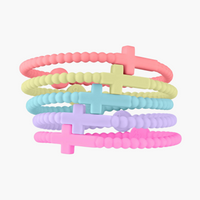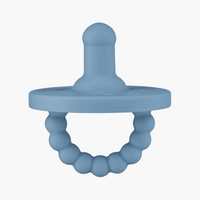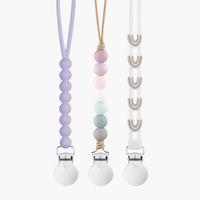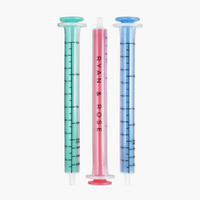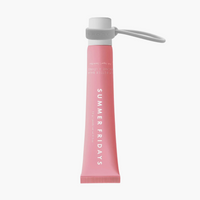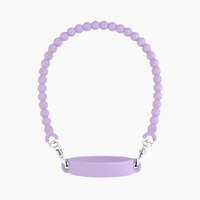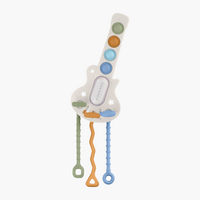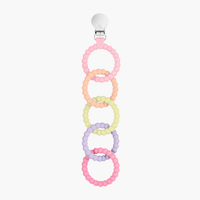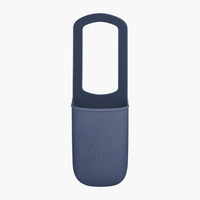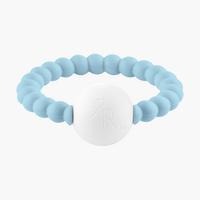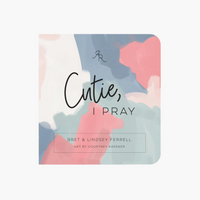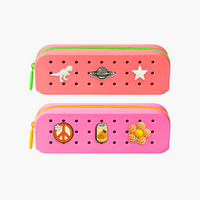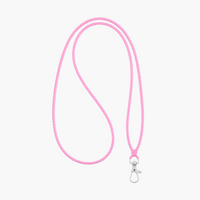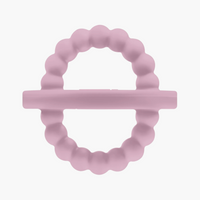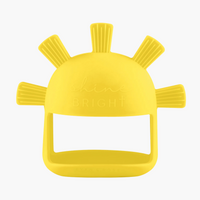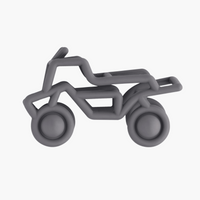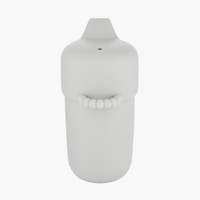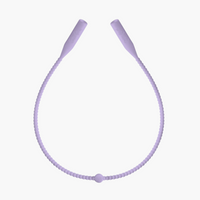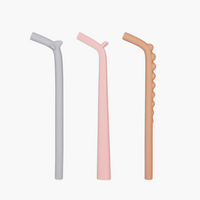This week we are teaming up with Brooke and Bridget (@thespeechsisters), two speech therapists and mamas, to bring you an informative perspective about pacifier use and speech development.
We know all mamas have questions, such as: does a pacifier affect speech? How do I detect speech issues? How do I help my little develop speech while using a pacifier?
Brooke and Bridget have treated hundreds of children with a wide range of delays and disorders and were even featured on Good Morning America for their work. They empower moms to advocate for their children, and we are excited they're sharing their knowledge with us!
Nobody knows your growing child quite like you do, which makes YOU the best person to express concerns if your child may not be meeting certain milestones. With resources such as @thespeechsisters, their website & courses, the daunting task of recognizing a delay can become much easier.
If you are not familiar with Ryan & Rose, you should know that we love pacifiers, especially Cutie PATs! Always recognize your child is unique and has individualized needs. No matter the research or opinions expressed here (or elsewhere), it should ultimately be your decision whether to use pacifiers or not.
We posed several questions for Brooke and Bridget, and they answered with their professional expertise here...
Q: Do pacifiers affect speech development in any way? Can prolonged pacifier use hinder speech?
Pacifiers have so many benefits for babies! They encourage a baby to self-soothe, satisfy a baby’s sucking reflex and lower the risk of SIDS. As speech therapists we even prefer pacifier sucking to thumb or finger sucking because when the time comes to eliminate the habit, parents can control the elimination of the behavior.
Pacifiers can affect speech development for babies and toddlers if a pacifier is used too frequently.
After 12 months of age we encourage parents to consider the frequency and duration of pacifier use. Between 12-24 months we recommend that pacifiers be used during “relaxing” times of the day, which would include book reading, naptime, bed time, and possibly longer car rides.
Between 12-24 months we want parents to promote “talk time” which allows babies to move from babbling into saying their first words and sentences. “Talk time” will occur during the active awake times in your day and this is when the pacifier should be removed from the child. When toddlers have the pacifier in their mouths during “talk time” it can negatively impact the way they produce sounds which may lead to articulation problems down the road.
Q: Do you have any tips for speech practice while my child still uses a pacifier?
The most effective thing you can do for speech development while your child is still using a pacifier is to make sure that the pacifier is taken out of their mouth when they are talking.
We make this recommendation because when a child speaks with a pacifier in his or her mouth it can limit opportunities to talk. It can also cause an unnatural position of the tongue, lips and jaw which can distort a child’s speech.
Q: Should I be concerned if my child goes from a pacifier to sucking his/her thumb, in regards to speech?
It is actually relatively common that a child will move from one oral habit to the other. If it does happen, both pacifier use and thumb sucking are essentially the same in the way they affect speech development, therefore, they same elimination plan would apply.
Q: At what age do you recommend weaning off a pacifier?
According to research, prolonged pacifier use (especially past the age of 3) can negatively impact speech development. We recommend a gradual, flexible, guilt-free weaning process for parents to set into motion between a child’s 2nd and 3rd birthday.
Newborn- 12 months: Allow baby to use a pacifier as often as they need or request it, but during any “talk time” such as cooing and babbling take it out so they can vocalize!
12-18 months: Begin to minimize the frequency of how often the pacifier is used. Limit pacifier use to “rest time” (e.g. story time before sleep time, nap time, and bedtime). Reduce pacifier use during “talk-time”. A parent can always eliminate pacifier use all together when and if the child/parent is ready for complete elimination.
24-36 months: Between ages 2-3 years of age we recommend weaning a child off of a pacifier and having completely eliminated the pacifier prior to a child’s 3rd birthday. We encourage this process to start around age 2 and at the latest by the child’s 3rd bithday. Research shows that extended pacifier use may cause:
- Dentition alignment issues after age 2 years old. When pacifiers are eliminated around age 2 many of these dentition issues will be naturally corrected (read research here)
- Changes to the shape of the roof of the mouth. Dentition and palatal structural changes may impact speech articulation (read research here)
- An increased risk of ear infections.

Q: Why Do The Speech Sisters Give Such a Wide Age Range to Wean and Eliminate the Pacifier?
Children’s pacifier usage will vary based on frequency and duration. We give a suggested age range because every child is different. And every parent is different too!
Some babies/parents may be more dependent on pacifiers than other babies and parents. Each family needs to be comfortable and ready to begin the weaning and elimination process of pacifier usage.
We want this process to be as easy and positive as possible. We give this range so parents can plan ahead and begin when their family is ready.
Our top suggestions are minimizing the pacifier usage to “rest time” between 12-18 months and eliminating the pacifier around age 2 but completely prior to a child’s 3rd birthday, to avoid the negative impacts of prolonged pacifier use.
Q: At what point should I get my child evaluated if I fear their speech is delayed? What are some signs to look for regarding hindered speech?
It is important to know that all children experience phonological processes which are speech sound errors that are used to simplify speech as a child is learning to talk. Children use these error patterns because they are not yet able to appropriately coordinate their lips, tongue, teeth, palate and jaw to form clear speech sounds. Each phonological process should be eliminated by a certain age (usually between 3 and 5 years old), so we know if a child reaches that age and still has the speech sound error then they should be evaluated by a speech-language pathologist.
When a child continues to use a pacifier or suck their thumb past the age of 3 we often see speech/articulation issues that are related to dentition, occlusion, and tongue thrust, in which case the production of the following sounds may be distorted due to inaccurate tongue placement: /s, z, t, d, l, n/.
Q: If my child won’t take a pacifier, am I doing something wrong or is there something else going on orally?
If your baby has an oral motor weakness, he or she would likely have motor weakness or be considered low-tone throughout their body. This type of weakness would also cause feeding problems, so if this were the cause, there would be other signs as well.

Discover More...
If you're interested in learning more about our Cutie products—from Cutie PATs to Cutie Clips and more—we encourage you to follow us on Instagram @ryanandrose and join the Cutie Community where other incredible members have built a meaningful community to help one another.
Named of its function, the Cutie PAT is both a Pacifier and Teether in one. It's made of 100% medical-grade silicone and comes in three styles: round stage 1 (for babies without teeth), round stage 2 (for babies with teeth), and flat (for babies that prefer a flattened nipple).
You can shop all of our Cutie PATs here on our website, including limited edition colors, or you can find our core colors at your local Target store and on their website!



